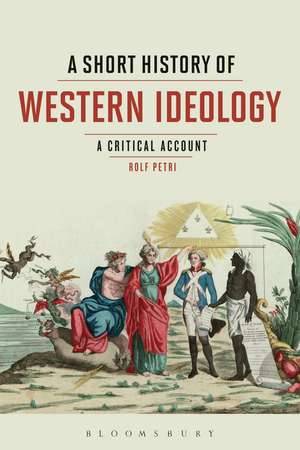A Short History of Western Ideology: A Critical Account
Autor Prof. Rolf Petrien Limba Engleză Paperback – 21 feb 2018
| Toate formatele și edițiile | Preț | Express |
|---|---|---|
| Paperback (1) | 185.47 lei 6-8 săpt. | |
| Bloomsbury Publishing – 21 feb 2018 | 185.47 lei 6-8 săpt. | |
| Hardback (1) | 569.37 lei 6-8 săpt. | |
| Bloomsbury Publishing – 21 feb 2018 | 569.37 lei 6-8 săpt. |
Preț: 185.47 lei
Preț vechi: 215.33 lei
-14% Nou
Puncte Express: 278
Preț estimativ în valută:
35.49€ • 38.54$ • 29.81£
35.49€ • 38.54$ • 29.81£
Carte tipărită la comandă
Livrare economică 22 aprilie-06 mai
Preluare comenzi: 021 569.72.76
Specificații
ISBN-13: 9781350026100
ISBN-10: 1350026107
Pagini: 256
Dimensiuni: 156 x 234 x 28 mm
Greutate: 0.36 kg
Editura: Bloomsbury Publishing
Colecția Bloomsbury Academic
Locul publicării:London, United Kingdom
ISBN-10: 1350026107
Pagini: 256
Dimensiuni: 156 x 234 x 28 mm
Greutate: 0.36 kg
Editura: Bloomsbury Publishing
Colecția Bloomsbury Academic
Locul publicării:London, United Kingdom
Caracteristici
It aims to offer an unbiased critique of Western ideology, while acknowledging that any critique potentially takes an ideological standpoint
Notă biografică
Rolf Petri is Professor of Contemporary History at Ca' Foscari University of Venice, Italy.
Cuprins
AcknowledgementsIntroduction1. Europe and History2. Freedom and Sovereignty3. Hierarchy among Equals4. A Craving for Goodness5. Ecology and ApocalypseAfterwordReferencesIndex
Recenzii
In a lengthy and highly sophisticated introduction, Petri (Ca' Foscari Univ. Italy) justifies the kind of intellectual history he is doing. In conceptual history, the author ranges freely among great philosophers, their epigones, and historical events to tell a story.
In this fascinating and important book Rolf Petri has created a concise history of Western ideology, each of the chapters a brilliant essay on its own terms, coming together to form a major historical statement that sums up what it has meant to think "Western" over the course of the last three centuries. This book compels us to rethink the most fundamental aspects of how we understand the role of ideology in the making of the modern world.
A brilliant account of core elements of Western ideology, explaining how they emerged from eschatological thinking to inform our modern experience of the world. Instead of running his readers through a schematic list of authors and their thought, Petri takes a holistic approach, looking at the presumptions they share. It is a tour de force which leads us from Herodotus to the Abrahamic religions, from Enlightenment and colonisation to global warming.
What might western ideology mean after decades of postcolonial criticism and deconstruction? What's left of Eurocentrism and Westernness? Rolf Petri dives deep into this immense cultural tradition, scrutinizing it with intellectual devices that localize it in a concrete geographical and historical context and, at the same time, delocalize it, viewing it within a non-hierarchical global context. Present-day preoccupations with civic bonds and the environment, temporality and making sense of history set the stage for rediscovering, rereading (and reshaping) the western intellectual tradition.
Petri's discussion of the nature and history of western ideology discusses the writings of philosophers and historians from Locke to Hobbes, and from Adam Smith to Marx and Engels. In the process, the reader is exposed to a critical and often innovative interpretation of these writers' works; their commonalities and their differences.
In this fascinating and important book Rolf Petri has created a concise history of Western ideology, each of the chapters a brilliant essay on its own terms, coming together to form a major historical statement that sums up what it has meant to think "Western" over the course of the last three centuries. This book compels us to rethink the most fundamental aspects of how we understand the role of ideology in the making of the modern world.
A brilliant account of core elements of Western ideology, explaining how they emerged from eschatological thinking to inform our modern experience of the world. Instead of running his readers through a schematic list of authors and their thought, Petri takes a holistic approach, looking at the presumptions they share. It is a tour de force which leads us from Herodotus to the Abrahamic religions, from Enlightenment and colonisation to global warming.
What might western ideology mean after decades of postcolonial criticism and deconstruction? What's left of Eurocentrism and Westernness? Rolf Petri dives deep into this immense cultural tradition, scrutinizing it with intellectual devices that localize it in a concrete geographical and historical context and, at the same time, delocalize it, viewing it within a non-hierarchical global context. Present-day preoccupations with civic bonds and the environment, temporality and making sense of history set the stage for rediscovering, rereading (and reshaping) the western intellectual tradition.
Petri's discussion of the nature and history of western ideology discusses the writings of philosophers and historians from Locke to Hobbes, and from Adam Smith to Marx and Engels. In the process, the reader is exposed to a critical and often innovative interpretation of these writers' works; their commonalities and their differences.
